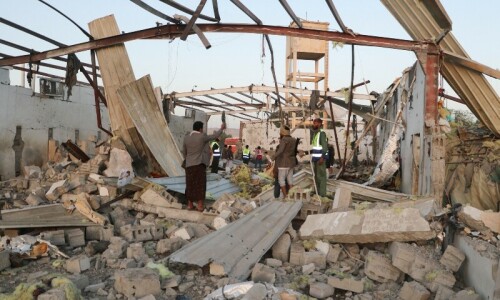
THE formulation of policies towards Taliban-controlled Afghanistan presents a significant challenge for Pakistan. The scenario emerging in Afghanistan after the American withdrawal is a more substantial security concern for Islamabad than was the case earlier, contrary to the misconception that the return of the Taliban represented a strategic success for Pakistan. The biggest concern is the resurgence of the Tehrik-i-Taliban Pakistan (TTP).
The TTP has regained its operational capabilities, with the Taliban regime in Afghanistan playing a crucial role in bolstering and empowering the group. The TTP claimed responsibility for as many as 42 attacks in Pakistan last month; 39 in Khyber Pakhtunkhwa (KP) and three in Balochistan. However, independent reports indicate that the TTP was involved in about 10 terrorist attacks in March.
The security forces in Pakistan have been actively diminishing the operational capabilities of these groups through sustained counterterrorism campaigns. In March, there was an increase in anti-militant operations, with 12 operations launched compared to six in the preceding month. Additionally, at the diplomatic level, Pakistan is said to be exerting whatever pressure it can on the Afghan Taliban to prevent the TTP and other terrorist organisations from establishing safe havens.
Following the withdrawal of foreign forces from Afghanistan, the Afghan security establishment that was trained by the United States and its allies rapidly disintegrated. This left many individuals with limited livelihood options, leading them to consider armed activities as a viable alternative. The choice of joining militant groups is believed to be driven more by economic necessities than ideological motivations.
It is imperative for state institutions to refrain from mixing security matters with political ones, and to resolve political conflicts politically. Security challenges have their own distinct dynamics that necessitate careful attention and consideration from both civilian and military leaders. By prioritising the security of the nation and maintaining a focussed approach, effective solutions can be worked out.
Prior to examining the mechanisms of insurgency in the tribal areas, it is essential to understand the various local and foreign militant groups operating there. The majority of these groups stand considerably weakened owing to military operations, US-operated drone strikes and internal divisions, forcing many of them to relocate to Afghanistan. However, there are still many that continue to pose a significant threat to Pakistan, and they possess the capability to instigate low-intensity insurgencies. The state has to have effective political and military strategies in place to counter this threat.
Tufail Dawar
North Waziristan
Published in Dawn, April 11th, 2025












































